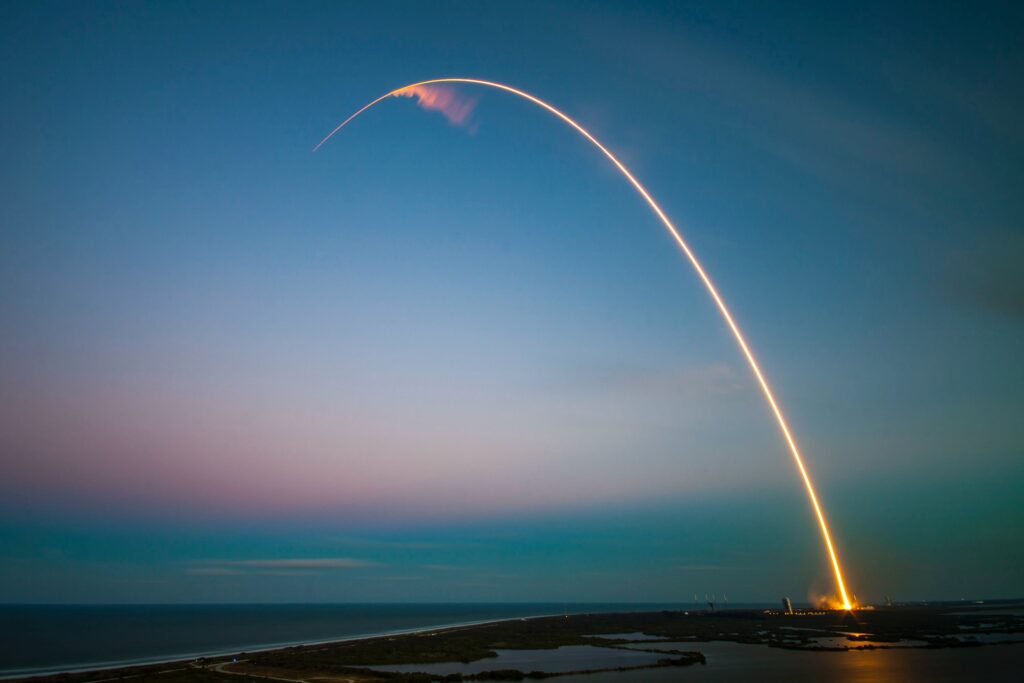1957: Early on in the Space Race, a stray dog who comes to be known as Laika is taken off the streets of Moscow and turned over to Soviet scientists. Her mission: To become the first animal to reach Earth orbit. She will not return.
In orbit
I can’t see Moscow from here. The stars are close, home is far. The moon shines closely. My heart beats faster. I can’t breathe. It is so very hot.
At launch
The sound and smell are unlike anything I’ve ever experienced before. My nostrils burn from the exhaust; the capsule rattles and roars. I imagine the sound of my name over and over again, but it’s not enough to drown out the din. My body pressed backward becomes heavy, then weightless. The sky darkens from gray to black. The stars grow nearer.
Three days before launch
The men paint me with a clear smelly liquid, put wires in my chest, dress me in tiny clothes, lock me in a metal capsule that’s cold to the touch. Before they close the hatch they pat my head and look at me with sad eyes. In the darkness, alone, I can hear their footsteps receding. I wait for them to come back; they always come back.
One week before launch
The man in charge, the one all the others listen to, brings me back to his house. His children are kind to me. It’s too cold to play outside, so they pull sticks off the trees and toss them around in the house, feed me chunks of beet and warm roasted chicken from their own plates. They kiss my nose and scratch my ears. They are gentle when they touch me and they laugh when I jump or speak. I think I will be happy here.
Two weeks before launch
They parade me around the city. They print my image on stamps and soap wrappers and cigarette cartons. My face appears life-size on the front page of the newspaper. They take me for car rides and put me in front of television cameras and radio mics. They gather by the hundreds, shouting things like Laika and Sputnik when they see me approach. I’ve never felt so much love. I’d follow them anywhere.
Three weeks before launch
The games they play are unpleasant. They lock me in cages, in a metal canister, feed me nothing but jellylike liquid. But after a time, they always come back, let me stand and stretch and eat. I’m never afraid they’ve left me for real. I sit when I’m told, and come when I’m told, and speak when I’m told. They call me things like Kudryavka and Limonchik. I like the sounds of these words when they come out of their mouths. Even through everything, their voices are soft and reassuring.
Four weeks before launch
The men who rescue me from the streets are kind. They don’t recoil when I approach. They are attentive; they stroke me and feed me as much as I can eat. My ribs no longer stick out against my skin, my bones no longer grind against each other. I no longer feel like I am going to die. I think I have finally found a home.
Before capture
People hurry down the street without stopping. They are bundled in their coats, the warm furs they can take off and hang up when they get home. Sometimes they carry their shopping, I can smell the meat and bread and vegetables, but they never drop any, they curse and kick at me when I get close. My stomach growls and my bones ache. There is nothing to eat. I have no home. I have no name. The sky is gray and the stars feel so far away. The moon shines dimly. Snow is always falling. It is so very cold.
—
Alanna Weissman is a writer and editor from New York City. Her work has appeared or is forthcoming in the New York Times, The Guardian, San Francisco Chronicle, Bellevue Literary Review, Entropy, and elsewhere. Currently, she is an MFA candidate at New York University, where she edits the Washington Square Review.
Photography: SpaceX
